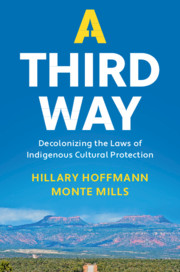Book contents
- A Third Way
- A Third Way
- Copyright page
- Dedication
- Contents
- Figures
- Preface
- Acknowledgments
- Introduction
- 1 Legal History and Foundations
- 2 The Jurisdictional Framework of the Second Way and the Cherokee Diaspora
- 3 Religious Freedom, the Value of Sacred Places, and the Price of Cultural Ignorance
- 4 Clashing Values, the Blackfeet, and a Measure of Success in the Badger-Two Medicine
- 5 Federal Cultural Protection Statutes
- 6 Tribal Laws
- 7 Both Ends of the Spectrum and Everything in Between
- 8 Indigenous Cultures and Intellectual Property
- 9 A Third Way for the Future
- Index
8 - Indigenous Cultures and Intellectual Property
Published online by Cambridge University Press: 16 July 2020
- A Third Way
- A Third Way
- Copyright page
- Dedication
- Contents
- Figures
- Preface
- Acknowledgments
- Introduction
- 1 Legal History and Foundations
- 2 The Jurisdictional Framework of the Second Way and the Cherokee Diaspora
- 3 Religious Freedom, the Value of Sacred Places, and the Price of Cultural Ignorance
- 4 Clashing Values, the Blackfeet, and a Measure of Success in the Badger-Two Medicine
- 5 Federal Cultural Protection Statutes
- 6 Tribal Laws
- 7 Both Ends of the Spectrum and Everything in Between
- 8 Indigenous Cultures and Intellectual Property
- 9 A Third Way for the Future
- Index
Summary
Nonindigenous American society has oscillated over the past two centuries between degrading indigenous cultures and appropriating them for pecuniary gain, whether as fashion statements or musical trends or perhaps to satisfy some broader twenty-first-century cultural yearning to resurrect the myth of the “Noble Savage,” deeply and purely connected to nature and immune from the toxins of modern daily life. Whatever or however it is labeled, this yearning remains an obsession; one rooted in the myths of American identity and at the same time inherently contradictory. On the one hand, nonindigenous society still derogates indigenous cultures the same way it did in the nation’s founding document or in legal opinions like Johnson v. M’Intosh. But, on the other hand, an element of non-indigenous society is simultaneously attracted to and collectively in awe of certain other aspects of indigenous culture. This attraction is reflected in the mass theft, looting, and general appropriation of indigenous imagery, music, religious practices and icons, ceramics, jewelry, totem poles, and regalia on a scale that is so vast it can be difficult to comprehend. The depth of the cultural assault on indigenous people has in many ways become so imbedded within American culture and the popular psyche that few nonindigenous citizens even notice it. Though similarly hidden, that cultural assault can be seen in rules of law as well.
- Type
- Chapter
- Information
- A Third WayDecolonizing the Laws of Indigenous Cultural Protection, pp. 132 - 150Publisher: Cambridge University PressPrint publication year: 2020



